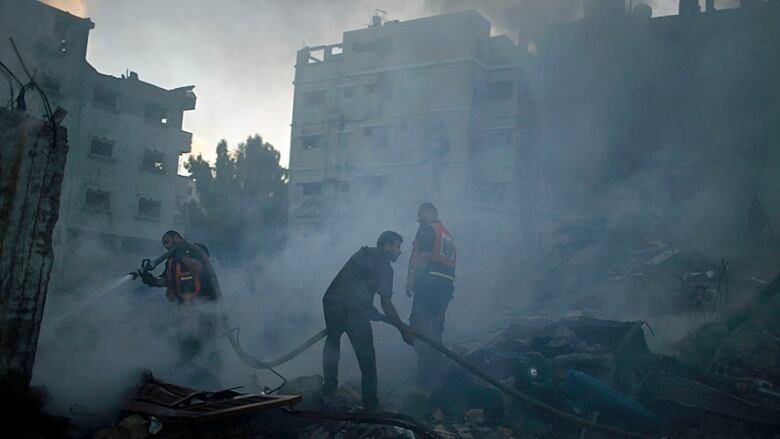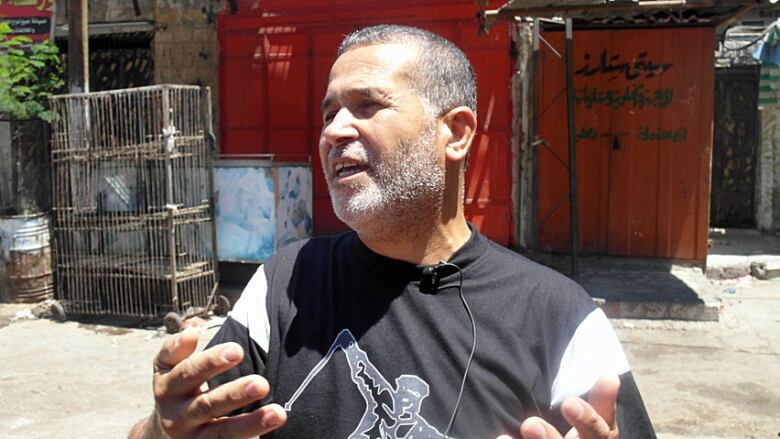Gaza suburbs in rubble as Israeli bombardment continues
Israeli shelling destroying homes, families; trying to avoid casualties, minister says
The main street leading into Shaja'ia is deserted. The shops that sell sweets and watermelons are shuttered. The groups of men and boys you see on most street corners, in normal times, are nowhere to be seen.
Shaja'ia is the suburb of Gaza City that has been pummelled by Israeli strikes that started early on Sunday morning. Three- and four-storey houses were flattened by artillery shells and missiles.
Gaza medical officials say at least 70 Palestinians were killed in the attack. But they expect the final number of dead to rise. It's too dangerous right now for rescue workers to sift through the rubble.
"Our dreams, our children are there," said Mahmoud Khalil, 59, who braved a quick trip into Shaja'ia Thursday morning to retrieve a few sofa cushions and other belongings from his home, which was damaged by Sunday's strikes.

Eleven of Khalil's family members are still unaccounted for. He believes they remain buried under their houses, brought down by Israeli shells.
Several cousins are still missing. He starts to name them. Jihad. Mamoud. Mohammed. The list goes on.
He struggles when I ask him how the strikes that happened early on a Sunday morning, while his family slept, have affected him.
"When you lose your family, you can't express yourself." He pauses for a long moment. "When you lose your family. You can't."
Khalil, along with his wife and children, took shelter with relatives in Gaza City.
He remembers leaving Shaja'ia, on foot. "The people were creeping, were running, were shocked."
The Hajjah family also fled Shaja'ia on Sunday. Dozens of them children, their parents and grandparents are sleeping on cardboard on the floor of classrooms at a UN-run school in Gaza City.
(On Thursday, a different UN school in Beit Hanoun, in the northern Gaza Strip, was hit, killing at least 15 people, medical officials said. Early reports suggested thatIsraeli tank shells had hit the school compound, but the Israeli militarysaid Hamasrockets that fell in thearea could have been responsible.The source of the shelling has not been officially confirmed yet.)
"Six of my family members died in Shaja'ia," Ahed Hajjah told me. "But there are many more caught under the rubble. We cannot count them. We are not sure who is missing."
Among the dead, Hajjah says, are two of his brothers. He will now help the widow of one of his brothers care for their six children, in addition to his own six children.
The Palestinian Authority called what happened Sunday in Shaja'ia a massacre. The shelling increased the calls by some in the international community for Israel to do more to protect Palestinian civilians.
After meeting Israeli Prime Minister Benjamin Netanyahu in Jerusalem, Philip Hammond, the new British foreign minister, said the U.K. is "gravely concerned" by the number of civilian casualties suffered in Gaza.
"We try to avoid civilian casualties," Israel's justice minister Tzipi Livni told me a day after the Shaja'ia attack. "This is why we called for a few days now [for people in] Shaja'ia to leave their homes. Because we were going to act there."

Livni, who is often considered to be the most dovish in Israel's security cabinet, blamed Hamas, saying the militant group told Shaja'ia residents to remain in their homes, despite the Israeli warning.
"We are trying to avoid civilian casualties, unlike Hamas who are targeting deliberately civilians."
Ahed Hajjah said after watching the missiles on Sunday, he is certain the Israeli military "strikes randomly. I think they mean to kill civilians."
"The Israelis claim there is Hamas there. There may some of their men in Shaja'ia. A house here, a house there, could be. But not everywhere where they bombed."













_(720p).jpg)


 OFFICIAL HD MUSIC VIDEO.jpg)
.jpg)



























































































